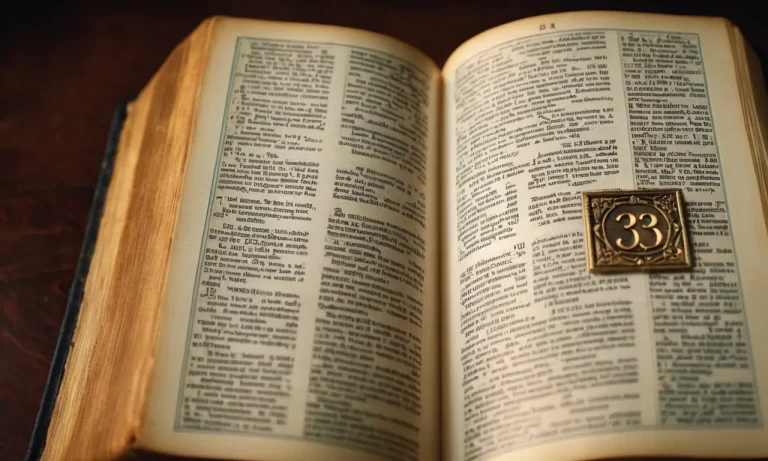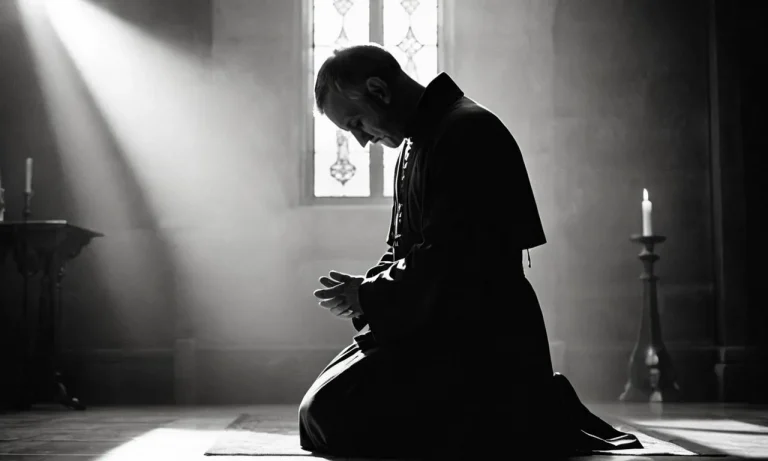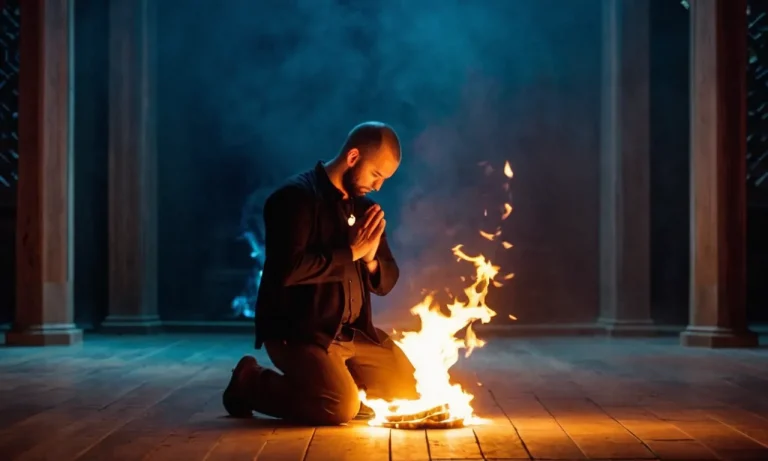What Does The Bible Say About Interracial Marriage?
Interracial marriage is a sensitive topic that raises questions for many Christians. If you’re short on time, here’s a quick answer: the Bible does not explicitly prohibit or condemn interracial marriages. However, there are a few verses that have been historically used to argue against it.
In this comprehensive article, we will analyze relevant Bible passages thoroughly to understand what scripture says about interracial marriage. We will look at Old Testament verses from Deuteronomy and Ezra, as well as New Testament teachings, to gain clarity on this issue.
Old Testament Verses Frequently Cited
Deuteronomy 7:3-4 – Commands Against Intermarriage
In the Old Testament, God commands the Israelites not to intermarry with those from the land they will possess. Specifically, Deuteronomy 7:3-4 states “Do not intermarry with them. Do not give your daughters to their sons or take their daughters for your sons, for they will turn your sons away from following me to serve other gods.
“ This command was meant for that specific time and place to protect religious purity. However, some cite it against interracial relationships today.
Most biblical scholars agree this verse referred to rival tribes like the Hittites and Amorites who worshipped idols, not other races. It prevented spiritual corruption, not racial mixing. Still, some latch onto it to condemn modern interracial unions, often merely due to skin color differences.
This narrow interpretation lacks biblical support when understood in full scriptural and historical context.
Ezra 9-10 – Ezra’s Reforms and Intermarriage
After Judah’s exile in Babylon, Israelite men had married women who worshipped foreign gods. Ezra the priest responds by commanding them to divorce these wives (Ezra 10:11). Some consider this sanctioning separating interracial marriages.
However, this passage in context condemns interfaith not interracial marriages. The wives were of different religions so posed spiritual threats. Race is never mentioned. Most scholars agree the passage focuses solely on religious purity essential to preserving Judah’s identity and faith after exile.
Using Ezra 9-10 to condemn interracial marriage takes verses out of context.
Ultimately, Old Testament verses on intermarriage refer to spiritual threats from idol worshippers, not races. Some may latch onto isolated words like “foreign women” to extrapolate meanings about skin color differences. But contextual study clearly shows preserving religious identity as the concern.
New Testament Teachings on Marriage and Race
Galatians 3:28 – Neither Jew nor Greek
In Galatians 3:28, Paul declares that in Christ, “There is neither Jew nor Greek, there is neither slave nor free, there is no male and female, for you are all one in Christ Jesus.” This verse teaches that all believers in Christ are equal before God, regardless of ethnicity, social status, or gender.
Though Paul does not directly address interracial marriage here, this passage lays a theological foundation for the equality of all people. If Jew and Greek are equal in Christ, that implies they are equal in all respects, including marriage.
1 Corinthians 7:39 – Marry Only In the Lord
In 1 Corinthians 7:39, Paul writes that a widow is free to marry “only in the Lord.” Some interpret this to mean that Christians should only marry fellow Christians. So while this verse does not prohibit interracial marriage, it could discourage marrying non-Christians.
However, the context is about remarriage after spousal death, not ethnicity. So likely Paul only meant not to marry idol-worshipers but did not intend to forbid interracial marriages among believers.
What Did Paul Mean by “Unequally Yoked”?
In 2 Corinthians 6:14, Paul warns believers against being “unequally yoked” with unbelievers. This is sometimes cited against interracial marriage, seeing it as “unequal yoking.” However, the context is clearly about partnerships with non-Christians generally, not marriage specifically.
Paul likely meant that Christians should avoid close business partnerships and relationships that may lead them to compromise their faith. But this does not forbid interracial marriages between believers. In fact, nowhere does the New Testament prohibit interracial marriages.
Common Arguments and Counterarguments
There are a few common arguments made both for and against interracial marriage from a biblical perspective. Here are some of the main points:
Against Interracial Marriage
- Some argue that God intends for people to marry within their own race or ethnicity. They point to passages in the Old Testament where God forbids the Israelites from intermarrying with people from other nations (Deuteronomy 7:3).
- Some believe that just as people should not marry unbelievers (2 Corinthians 6:14), they should also not marry outside their race.
- Some think that interracial marriages face additional challenges and are less likely to succeed long-term.
In Support of Interracial Marriage
- The Bible teaches that all people are equal before God and that racial divisions are a result of sin (Galatians 3:28). God values diversity and people from every nation.
- While the Old Testament prohibited intermarriage in some contexts, this was specifically to protect the Israelites from adopting the idolatrous practices of other nations. This concern no longer applies in the same way.
- The New Testament removes many of the Old Testament divisions between people groups. The gospel is for all tribes and tongues (Revelation 7:9).
- Marriage is still intended to be between believers (1 Corinthians 7:39). But a couple’s race or ethnicity is not a barrier if both partners are faithful Christians.
There are good arguments on both sides. Ultimately it comes down to one’s view on the authority of the Old Testament laws, the interpretative framework one adopts for understanding relations between ethnic groups, and whether one believes races should remain separate or integrated in society and family life.
Christians of good faith disagree on these matters.
Pastoral Considerations for Interracial Couples
Interracial marriages can present unique challenges that require wisdom and sensitivity from pastors and church leaders. Here are some key considerations for supporting interracial couples in the church:
Recognize Historical Injustices and Present-Day Prejudices
The church should acknowledge that interracial relationships have not always been accepted or legal in our country. Past injustices like anti-miscegenation laws have left wounds. While great progress has been made, interracial couples may still experience occasional disapproval or prejudice today.
The church should be a safe space for open conversation about this history and present realities.
Premarital Counseling
Pastors should take time to understand the unique dynamics of each interracial relationship during premarital counseling. Explore how cultural differences shape the couple’s values and communication styles.
Discuss how they will navigate potential challenges like discrimination or tension between family members who may disapprove. Guide them to appreciate their differences and grow closer through them.
Incorporate Diverse Voices
Seek input from leaders and mentors of diverse racial backgrounds when developing teachings and policies related to marriage and race. Multicultural wisdom can help identify blind spots and ensure materials are respectful and inclusive.
Foster Cross-Cultural Fellowship
Facilitate friendship between interracial couples and families of their same racial background within the church. This provides support and allows their children to connect with Christians who share their ethnic heritage.
Intentionally cultivate a welcoming community where diverse believers worship and serve God together.
Address Sensitive Issues
The church should exercise wisdom when preaching on topics like interracial marriage. Teach respectfully from Scripture, emphasizing that ethnicity is not a barrier for marriage in God’s eyes. Refer to interracial couples already in the church to illustrate teachings in practice.
With thoughtful guidance, interracial couples can thrive in the supportive embrace of the church community. We reflect God’s love best when people of every race, culture and background are equally welcomed as brothers and sisters in Christ.
Conclusion
To conclude, while the Bible does not clearly prohibit interracial marriage, there are differing interpretations. Christians seeking God’s wisdom should carefully and thoughtfully consider the issue in light of scriptural principles of faith, unity, and love.








